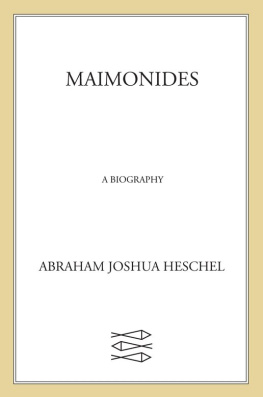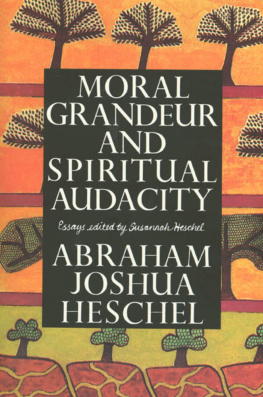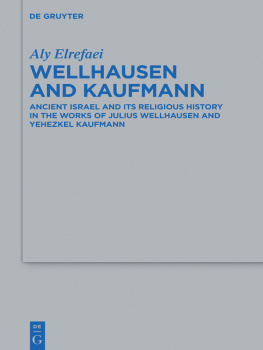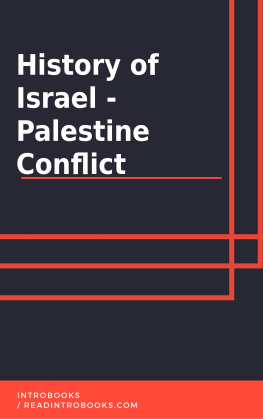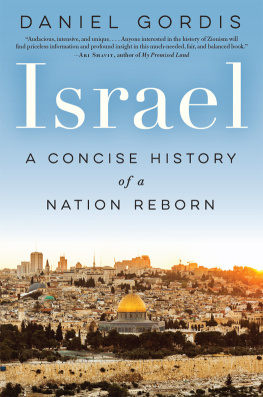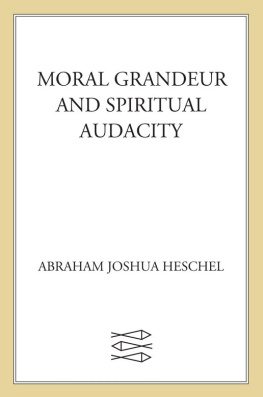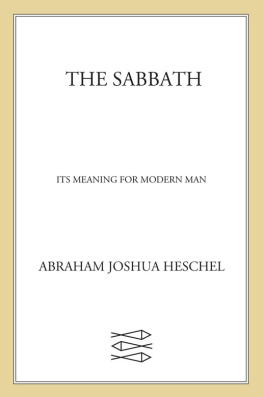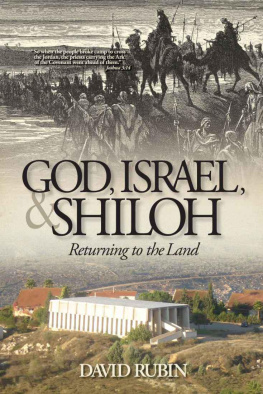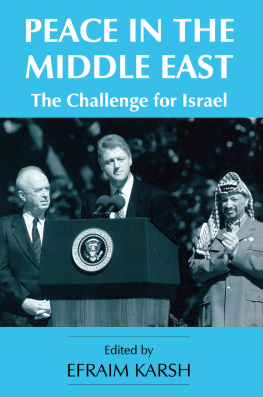J uly, 1967 I have discovered a new land. Israel is not the same as before. There is great astonishment in the souls. It is as if the prophets had risen from their graves. Their words ring in a new way. Jerusalem is everywhere, she hovers over the whole country. There is a new radiance, a new awe.
The great quality of a miracle is not in its being an unexpected, unbelievable event in which the presence of the holy bursts forth, but in its happening to human beings who are profoundly astonished at such an outburst.
My astonishment is mixed with anxiety. Am I worthy? Am I able to appreciate the marvel?
I did not enter on my own the city of Jerusalem. Streams of endless craving, clinging, dreaming, flowing day and night, midnights, years, decades, centuries, millennia, streams of tears, pledging, waitingfrom all over the world, from all corners of the earthcarried us of this generation to the Wall. My ancestors could only dream of youto my people in Auschwitz you were more remote than the moon, and I can touch your stones! Am I worthy? How shall I ever repay for these moments?
The martyrs of all ages are sitting at the gates of heaven, having refused to enter the world to come lest they forget Israels pledge given in and for this world:
If I forget you, O Jerusalem
let my right hand wither.
Let my tongue cleave to the roof of my mouth
if I do not remember you
if I do not set Jerusalem
above my highest joys.
Psalm 137:56
They would rather be without heaven than forget the glory of Jerusalem. From time to time their souls would leave the gates of heaven to go on a pilgrimage to the souls of the Jewish people, reminding them that God himself is in exile, that He will not enter heavenly Jerusalem until His people Israel will enter Jerusalem here.
Jerusalem! I always try to see the inner force that emanates from you, enveloping and transcending all weariness and travail. I try to use my eyes, and there is a cloud. Is Jerusalem higher than the road I walk on? Does she hover in the air above me? No, in Jerusalem past is present, and heaven is almost here. For an instant I am near to Hillel, who is close by. All of our history is within reach.
Jerusalem, you only see her when you hear. She has been an ear when no one else heard, an ear open to prophets denunciations, to prophets consolations, to the lamentations of ages, to the hopes of countless sages and saints; an ear to prayers flowing from distant places. And she is more than an ear. Jerusalem is a witness, an echo of eternity. Stand still and listen. We know Isaiahs voice from hearsay, yet these stones heard him when he said concerning Judah and Jerusalem (2:24):
It shall come to pass in the latter days .
For out of Zion shall go forth Torah,
and the word of the Lord from Jerusalem .
He shall judge between the nations,
and shall decide for many peoples;
nation shall not lift up sword against nation,
neither shall they learn war any more.
Jerusalem was stopped in the middle of her speech. She is a voice interrupted. Let Jerusalem speak again to our people, to all people.
The words have gone out of here and have entered the pages of holy books. And yet Jerusalem has not given herself away. There is so much more in store. Jerusalem is never at the end of the road. She is the city where waiting for God was born, where the anticipation of everlasting peace came into being. Jerusalem is waiting for the prologue of redemption, for new beginning.
What is the secret of Jerusalem? Her past is a prelude. Her power is in reviving. Here silence is prediction, the walls are in suspense. It may happen any moment: a shoot may come forth out of the stock of Jesse, a twig may grow forth out of his roots .
This is a city never indifferent to the sky. The evenings often feel like Kol Nidre nights. Unheard music, transfiguring thoughts. Prayers are vibrant. The Sabbath finds it hard to go away.
Here Isaiah (6:3) heard:
Holy, holy, holy is the Lord of hosts:
the whole earth is full of His glory.
No words more magnificent have ever been uttered. Here was the Holy of Holies.
Jerusalem has the look of a place that is looked at the eyes of the Lord your God are always upon it, from the beginning of the year to the end of the year (Deuteronomy 11:12). Psalms inhabit the hills, the air is hallelujah. Hidden harps. Dormant songs.
A necessary condition affecting human beliefs in philosophy and religion is the paradox. The source of their paradoxical character has its origin in the essential polarity of human being, e.g., in the opposition between unconditional truth and mans necessarily conditional perception of truth, in the opposition of unity and multiplicity, of the general and the particular, of the universal and the individual.
All men are created equal, yet no two faces are alike. All days can be defined in the same waythe period of the earths revolution around its axisyet the Sabbath is conceived in a special way. We are called upon to respect all human beings, yet are also called upon to revere our parents in a special way.
The chief difference between common sense and philosophical doctrine may be said to be that the philosopher by his finer analysis, reveals the paradoxes which our everyday consciousness veils by means of a more or less thoughtless traditional phraseology. The philosopher is more frank with his antithesis. He does not invent the paradoxes; he confesses them. To ignore the paradox is to miss the truth.
King Solomon in his speech inaugurating the Temple said: The Lord dwells in thick darkness.
Do I not fill heaven and earth? says the Lord (Jeremiah 23:24). The whole earth is full of His glory (Isaiah 6:3). Yet, although the Shekinah, the Presence, is everywhere, the experience of the Shekinah is always somewhere, because man always lives at a particular place in space.
Living truth is the blending of the universal and the individual, of idea and understanding, of distance and intimacy, the ineffable and the expressible, the timeless and the temporal, body and soul, time and space.
Even those who believe that God is everywhere set aside a place for a sanctuary. For the sacred to be sensed at all moments everywhere, it must also at this moment be somewhere.
At the beginning is the moment, time, Gods presence, holiness in time, the Seventh Day.
When history began, there was only one holiness in the world, holiness in time. When at Sinai the word of God was about to be heard, a call for holiness in man was proclaimed: Thou shalt be unto me a holy people. It was only after the people had succumbed to the temptation of worshipping a thing, a golden calf, that the erection of a Tabernacle, of holiness in space, was commanded. The sanctity of time came first, the sanctity of man came second, and the sanctity of space last. Time was hallowed by God; space, the Tabernacle, was consecrated by Moses .
The ancient rabbis discern three aspects of holiness: the holiness of the Name of God, the holiness of the Sabbath, and the holiness of Israel. The holiness of the Sabbath preceded the holiness of Israel. The holiness of the land of Israel is derived from the holiness of the people of Israel. The land was not holy at the time of Terah or even at the time of the Patriarchs. It was sanctified by the people when they entered the land under the leadership of Joshua. The land was sanctified by the people, and the Sabbath was sanctified by God.


